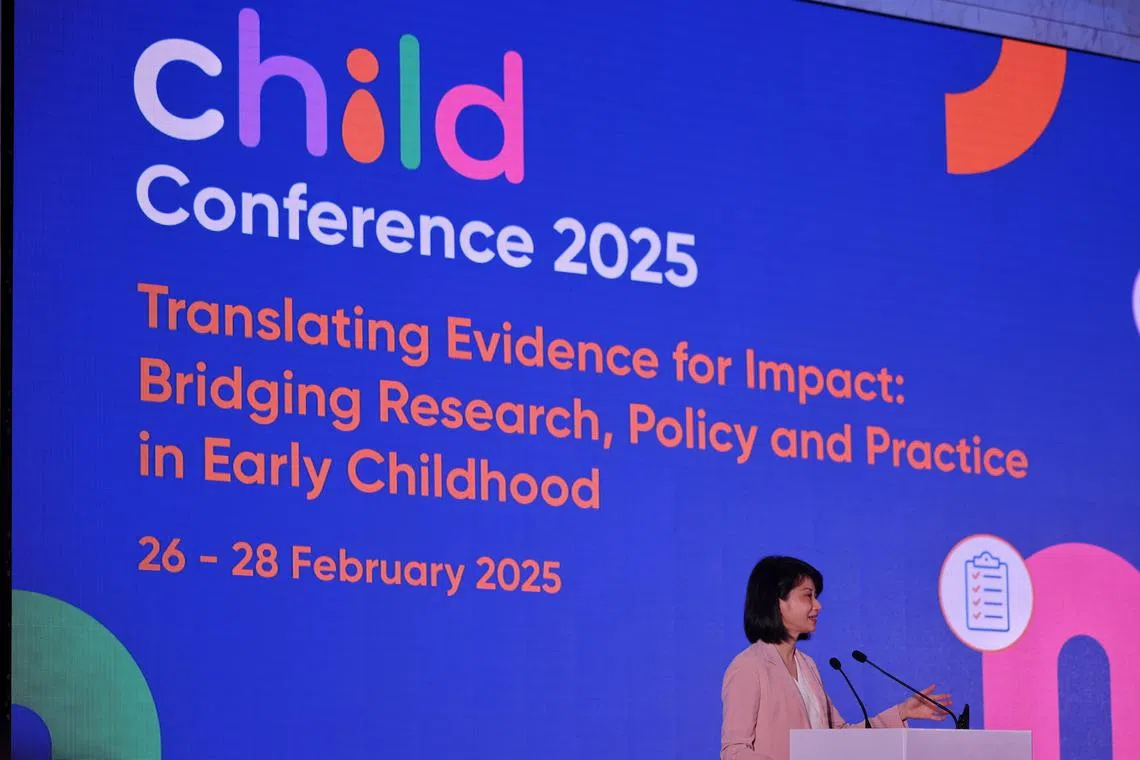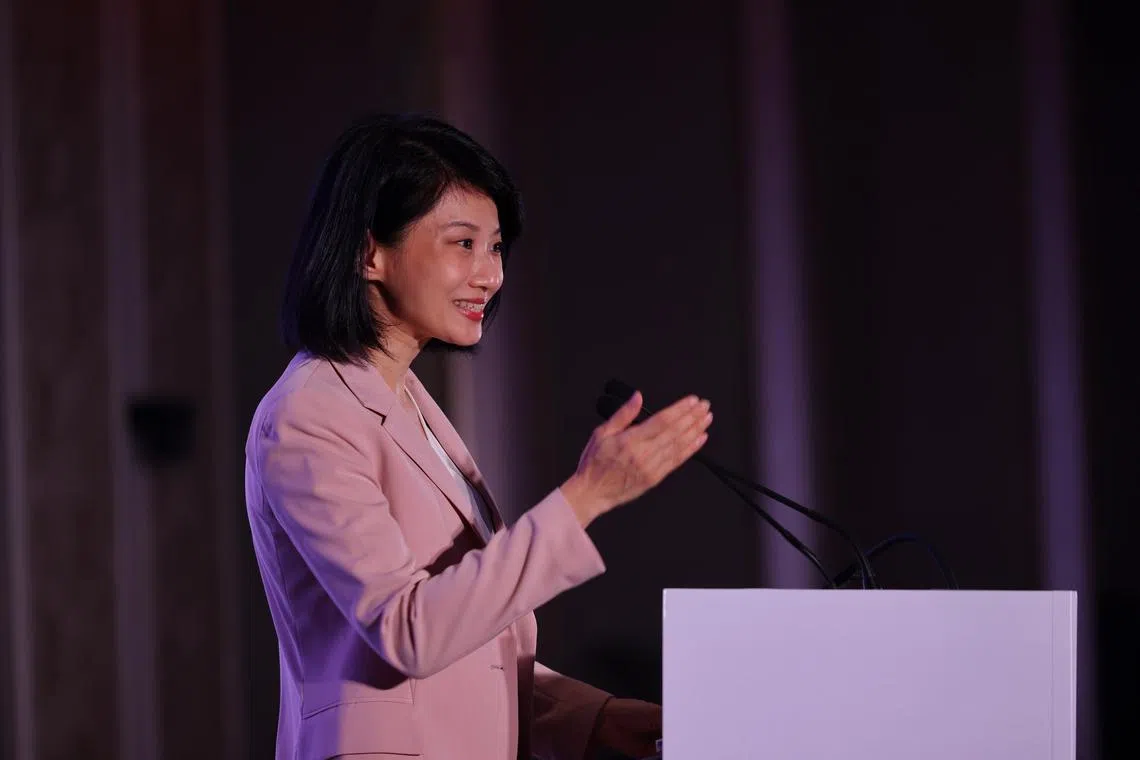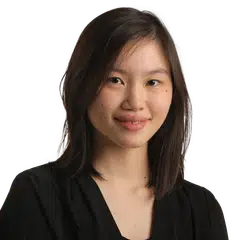Beyond the ABCs: Pre-schoolers role-play to improve social, emotional skills
Sign up now: Get ST's newsletters delivered to your inbox

Minister of State for Home Affairs, and Social and Family Development Sun Xueling speaking at the Child Conference at Orchard Hotel on Feb 27.
ST PHOTO: JASON QUAH
Follow topic:
SINGAPORE – What should children do when some in their group want to go to the zoo, while others want to go to the playground?
What should they do if their group runs out of supplies?
These are some problems pre-schoolers here are being presented with in school to challenge them to come up with solutions as part of a new approach to equip them with skills they need to thrive in school and beyond.
Through role-playing, for instance, children get to practise problem-solving skills and are given chances to make decisions and take responsibility for them.
Games where they jump when they see pink cards flashed on a screen, dance when they see blue cards and freeze when they see white cards help train their working memory.
The new approach, called Enhancing and Supporting Early Development to Better Children’s Lives (Easel), was developed in the light of local research studies which have shown a gap in pre-school education here – that children have trouble regulating their emotions and managing outbursts.
Easel project director Cheryl Seah said that while early childhood education in Singapore has focused on literacy and numeracy skills, research has found that children’s social and emotional regulation skills lag behind their academic readiness.
She said “child-led” learning – as opposed to “educator-led” learning – can encourage children to explore and experiment.
“If they don’t face challenges and they’re being instructed about the ways to behave, I think we might bring up a generation of children who may not be so adaptable and flexible and resilient in the long run.”
Dr Seah was speaking at the Child (Centre for Holistic Initiatives for Learning and Development) Conference, held at Orchard Hotel Singapore on Feb 27.
She is also director of the Centre for Evidence and Implementation, a non-profit organisation that helps generate and implement evidence to support children facing adversity. The centre is a core partner of Child.
Easel consists of a set of practices designed for educators to use with children aged three to six years in early childhood settings to improve the development of their socio-emotional, behavioural and executive functions, or skills such as working memory and flexible thinking.
The approach was trialled at 18 childcare centres, involving close to 50 educators and 560 children, from February to October 2023.
The trial found that educators felt Easel improved their relationship with the children, and that they perceived positive effects on the pre-schoolers.
Speaking about the approach, Dr Seah said that if the children do something well, the educators are encouraged to be more descriptive in their praise – for instance, noting that the children shared things with their friends or listened to them – so that children can learn from what they did right.
Educators are also trained to pause and give children the opportunity to respond when they are asked a question, instead of jumping in too quickly to facilitate the conversation.
The 2023 trial was led by Child – which was established in 2020 in the NUS Yong Loo Lin School of Medicine with the support of the Lien Foundation – in partnership with the Early Childhood Development Agency and the National Institute of Early Childhood Development.
The Child team will continue to trial the Easel programme, with plans to scale it up. It will work with early childhood providers such as the PAP Community Foundation, Little Olive Tree and M.Y World to adopt the approach in a second trial in 2025.
A group of pre-school leaders, curriculum leaders, early interventionists and educators will meet regularly to exchange ideas on how to better incorporate Easel practices into classroom routines.
At the Child Conference, findings were also shared on a coaching programme to enhance grandparents’ responsiveness when playing with young children – LEarning To Support Play (Let’s Play).
Dr Seah said the programme came about as parenting programmes here are typically catered to parents and neglect other caregivers such as grandparents and domestic helpers.
“Grandparents tend to focus on physical care, like feeding young kids. Some of them said that they don’t know how to play with their grandkids and ask if they should sit and watch the kids play.
“But these are missed opportunities to nurture and bond with their grandchildren when playing with them.”
Let’s Play is a partnership between Child, Temasek Foundation and Suncare SG, a charity supporting the well-being of children and youth.
Thirty-one grandparents, 27 parents and 27 grandchildren aged four months to 48 months participated in the programme’s feasibility study from April to July 2024.
The one-on-one coaching programme taught grandparents to observe, understand and respond to the needs of the children over four hour-long sessions.
The seniors had 10-minute videos recorded of their interactions with their grandchildren before and after the programme, for researchers to assess their caregiving skills.
The grandparents also attended focus group discussions to share their experiences.
Overall, grandparents were observed to have increased affection, responsiveness, encouragement and teaching during play interactions.
The team is considering holding group sessions, instead of one-on-one home coaching, in scaling up the programme.
A similar training programme for domestic helpers is also in the pipeline in the coming months.

Minister of State for Social and Family Development Sun Xueling said the Government relies on data from researchers to inform its decisions, to ensure that it can identify and meet the needs of children and families with its initiatives.
ST PHOTO: JASON QUAH
Speaking at the conference, Minister of State for Health Rahayu Mahzam said Child also works with the National University Health System to implement a community preventive paediatrics health project for children from low-income families, called Heads-UPP (Health and Development Support in Preschool Partnerships).
The project enhances support for lower-income families through health and developmental screening to identify at-risk children, and refers them to social agencies and pre-schools to receive individualised health action plans, said Ms Rahayu, who also chairs Child’s policy advisory council.
Minister of State for Social and Family Development Sun Xueling, who was guest of honour at the conference, said the Government relies on data from researchers to inform its decisions to ensure that it can identify and meet the needs of children and families with its initiatives.
She gave the example of how the KidStart programme – which supports the development of children in lower-income homes – was pared down to home visitations, with play group sessions discontinued, as an evaluation found that it brought about less significant improvements.
“We look to (researchers) for the relevant data and insights which can be translated into actionable policies and programmes,” she said.


